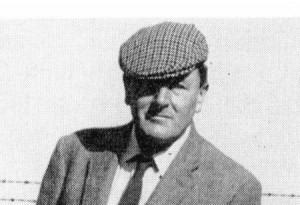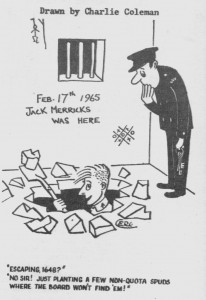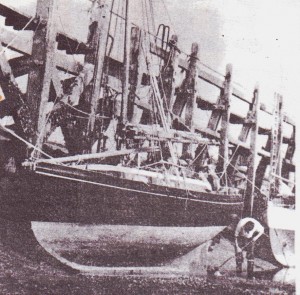The Rebel Farmer – And One of the Most Interesting Men I ever Met
By Jim Hollands
Farmer Jack Merricks of Icklesham. often called the Rebel farmer. is surely one of the best known of local personalities. His clashes with various Government Boards in the years since the War have often made headlines in the local and National Press and on one occasion resulted in him spending seven days in Brixton Prison. He is a man deeply bound by principles of fair play, he hates Red tape and restrictions and frequently gets involved in causes, invariably supporting the underdog.

Born in 1910) at New Coghurst Farm. Guestling, Jack was raised on the land. His father, Walter Merricks. who went to Rye Grammar School. was a remarkable man who had started farming in a small way. He was an outstanding judge of livestock, and became an authority on modern grazing methods. He excelled at athletics and sport and numbered many sporting personalities among his friends. cricketers Hobbs. Sutcliffe and Parkin to name but a few. Jack’s grandfather. William Merricks, farmed Pickham, Guestling, and his great-grandfather owned and farmed two hop farms at Bodiam and successfully campaigned against the hop tax. His mother came from the well-known Marshland Cooke family, sheep farmers, and from thence came an infusion of Irish and Cornish sea-faring blood.
The young Jack Merricks was educated at Bethany School. Goudhurst.
His memories of the First World War are of German prisoners working in his father’s Brook Farm at lcklesham and of the day his father took him to Pett Level to see the damage done by a bomb dropped from a Zeppelin.
The school holidays were spent at Winchelsea Beach where the family hired a bungalow and the journey was made by horse-drawn wagon. At that time the place was almost deserted, just five or six bungalows and a few Coastguard houses. These were very happy times.
During his school days the family enterprise had expanded greatly. Walter Merricks now farmed Manor and Brook farms at lcklesham and White House Farm. Brookland. The family lived at The Manor and it was here that Jack began his farming career at the age of sixteen.
In 1926 fanning was quite a different proposition to that of this modern age of combine harvesters and tracked – tractors. He well remembers sheep and cattle-droving with his brother Dick; there were no cattle lorries. It was not uncommon to spend three or four days on the road driving sheep from “Cuckoo Fair”. Heathfield, to the Romney Marshes, all the way on foot. Cattle and sheep were also regularly driven to Rye market. Steam threshing was the order of the day, quite a complicated job with the great iron steam engine driving the thresher. One of Jack’s first jobs was to fetch water for the steam engine.
For pleasure Jack Merricks turned to the sea. First fishing off the beach at Winchelsea, then boat fishing. He acquired a small flat-bottomed punt and soon graduated to a precarious canvas boat. He once scrounged a trip in the Rye Harbour lifeboat on a practice run. Whenever there was a chance he was out in Rye bay.
In November, 1928, during a heavy on-shore gale, the Rye Harbour lifeboat capsized, all 18 of her crew perished. The news reached the Manor Farm about mid-day and Jack’s mother immediately set about arranging a whist drive to raise money for the dependants of these brave men.
When the Rye Harbour Sailing Club was formed the young Jack Merricks was a founder member, a fact of which he is very proud. “Menagerie” races were held for all types of sailing dinghies and these events, both on the river and at sea became the focal point of his efforts. Around this time Jack recalls that he took part in a rather foolhardy escapade. With two friends he sailed from Hastings to Boulogne and back to Rye in a 14ft. International dinghy with a 26ft. mast; not the type of exploit he would undertake now, after another 30 years experience of the sea.
Village life was quiet and self-contained in the late ‘20s and early ‘30s. Wheat was ground and bread was baked at Hog Hill Mill, lcklesham. Bob Horton, the local blacksmith, made and repaired the farm implements, besides the more traditional task of shoeing the horses which were the backbone of farming at that time. Richard Baker, the saddler, of Icklesham made the harness, while at Guestling Thorne, Mr. Hunter, the wheelwright made the wagons which carried the harvest and hops over the rough East Sussex roads. –
As the years passed Jack gradually assumed more and more responsibility on the Merricks’ farms and began to take an active interest in farm politics. His first real conflict with authority came in the Tithe War of the ‘30s but this did not meet with the success of some of his later campaigns.
A treasured pre-war memory was when he sailed with Harry “Crusty” Crampton in the smack “Meteor”. The “Meteor” was the last sailing smack to operate out of Rye. A beautiful Rye-built vessel owner-skippered by one of Rye’s greatest fishermen. “Crusty” was kind, courageous, a great philosopher and character. They fished the Trail in Rye Day day and night for a week, landing their catch each morning at Hastings. At the end of the week they were driven to take shelter from a gale in Folkestone Harbour.
AWARDED THE B.EM.
The Second World War came and on the first day of its formation Jack Merricks joined the Rye unit of the Home Guard (then known as the Local Defence Volunteers). On formation of the secret underground movement he was made leader of the local group, twice mentioned in dispatches and awarded the B.E.M.
The War brought a swift revolution to agriculture. The U-boat menace dictated that the country should be as self-supporting as possible. Jack recalls that one spring they ploughed up 300 acres of lush marsh pasture land and converted it for arable use. This transformation meant that the Merricks’ had to learn a whole new system of farming. almost overnight. Jack was the first to use a combine harvester in the district.
In 1940. Jack married Miss Margherita Hirt, a Swiss girl whom he had met on a ski-ing holiday in Zermatt before the outbreak of war. He has two sons.
During the latter part of the War he served on the Agricultural Committee (Battle branch). When the War ended Jack found time to pursue his love of sailing. He bought a fishing trawler, the ‘Gadfly” and converted her into a sailing yacht. In this fine vessel, which he still owns. he has explored the South and East coasts and ventured further afield to Holland. Belgium and France on many occasions. One of his most memorable trips was with Rye Harbour master, Jack Doust. They sailed “Gadfly” down to Brixham in Devon. There they went aboard the replica of the famous ship Mayflower” a few days before she sailed to America.
Jack Merricks became concerned by the way some farmers were being treated under the Government Agricultural Act of 1947 which allowed for the eviction of farmers from their farms and homes if they were considered not to be farming in an efficient manner. He became the champion of several local farmers at this time, organising their defence against measures he thought undermined the foundations of British justice. One particular defence he organised was for the Crouch brothers of Lidham Hill Farm at Guestling. He thought this a particularly bad case of victimisation. The brothers and their seven dependants were to be evicted for allegedly not farming their land in an efficient manner. Both brothers had fought in the First World War, one was at the Battle of Ypres and the other at Jutland. Jack’s arguments carried the day on that occasion.
By 1950, when the post-war marketing boards were beginning to take shape he realised that there was too much similarity with the dictatorial Russian policy of collectivism. In the interest of British agriculture Jack Merricks, who is not an agitator offering only constructive criticisms, has taken stand after stand against the various marketing boards. He took a prominent part in the campaign against the Tomato and Cucumber Marketing Board.
In 1958 he was first elected on to the Potato Marketing Board and bent his back to the task of protecting the interests of growers.

It was with this Board that he had one of his biggest battles. In 1965 his refusal to pay the Board’s levies resulted in him spending seven days in Brixton Prison. This fight typified his true English character—a man who bad the courage of his convictions and stood out for his principles. It was a Board sympathiser who weakened first. Worried about the amount of adverse publicity which Jack’s imprisonment raised against the Board, for his case was blazoned across the national press every breakfast time, the Board sympathisers paid the fine and Jack returned to his farming. Deciding that be would have more influence on the Board if he rejoined it, Jack Merricks shortly afterwards stood for election and was elected to the Board for the second time. He still serves today having just been elected for his third three-year term of office at the top of the poll.
In 1961 Jack Merricks played an important part in Rye’s history, and it is through this event that he has his greatest claim to being a Rye personality, Always in close touch with the town with farms on either side of it and his boat at Rye Harbour, he has built up over the years a close attachment to the Rye community, it is probably true to say that he is better known to Ryers than are many Ryers.
In November, 1961 the Kent River Board promoted a Private Bill in Parliament to give it power to build a sluice and lock across the river Rother at Rye Harbour. The Board presented an attractive outline to the public, explaining that the Rother Valley would get better drainage as a result and that boating interests would be better served by the adoption of the scheme.
When Jack learned of the proposals he became very worried, it all sounded so simple, the Board’s experts and engineers were convinced that the scheme would work but Jack. whose whole life was farming the marshes and sailing from Rye Harbour, could see an awful lot of problems and disadvantages in the scheme.
He became convinced that if the sluice and lock were built and the natural scour of the tidal river eliminated then the Rother would silt up. causing less and less water to be drained from the surrounding marshland, This was his main argument but there were others. The K.R.B. scheme would allow for the lock to be closed for up to 40 days each year for repairs. He maintained this could mean the end of Rye as a port and would adversely affect the fishing fleet. The Parliamentary Bill would prejudice the ancient rights of navigation in the harbour and the river.
At the outset it looked a forgone conclusion that the Kent River Board’s proposals would go through. The Bill had the support of nine Rother Valley Farmers Unions, the support of Rye Borough Council (though this was not unanimous and four names went on the record as having voted against namely Councillors A. E. Horner, Miss. M. Warren, Mrs M. Reed and G. S. Bagley), Icklesham Parish Council and even at one time it was reported the Rye fishermen. This was later denied by the Rye Fishermen’s Society. Neither East Sussex County Council nor the Battle Rural District Council opposed the scheme.
Against these mighty forces Jack Merricks was resolved to do battle. He hoped that once the facts were understood many people of Rye and Rye Harbour and farmers from – the area would unite to fight this threat to the marshland and to the age-old rights of the Port of Rye.
With 39 farmers, who farmed over 5,000 acres of marshland Jack Merricks petitioned against the Bill in the House of Lords. Petitions were also lodged by the Royal Yachting Association (with the support of the Rye Harbour Sailing Club and the local Boat Owners’ Association) and by the Port of Rye Protection Society on the Committee of which Jack Merricks served along with Lord Killearn (president), Sir Bernard White (chairman), Mr. J. Kenyon Gregory (secretary), Councillor Mrs. M. Reed (treasurer), and fellow committee members Mr. 1. A. Collard, Mr.. G. Reed, Councillor G. S. Bagley, Dr. J. F. Thompson, Mr. G. Steel, Mr. Duncan Wylson, Councillor A. E. Homer and Captain Lovegrove, R.N.
One of the best efforts of the campaign was a poem written by Jack which put his argument in a nutshell.
Ryers and Marshmen awake?
Before it is too late:
For time is short
To save the Port;
So fight with ardour
Or lose Rye Harbour;
The K.R.B. are willed
A mighty sluice to build.
The scheme is craven,
It’ll silt up the haven:
Woe, woe betide?
If they. stop the tide
There’ll be floods galore
As in times of yore.
Now don’t be misled,
Or you’ll be bled
Of a million crown
and the marsh will drown
To save the Rother
Is worth some bother.
So to Parliament petition
The sluice to perdition;
Lets fight and kill
This devilish Bill.
TWO QUOTES
Two quotes from the affair spring to mind when one thinks back to those 1962 days. Neither is attributed to Jack Merricks but his feelings were surely contained in them. “Never let it be said that Rye lost its port through apathy” (Mr. G. B. Aston). “The right of Ryers to have a port is their birthright. We do not know what the future holds. I feel the rights of Ryers should be stuck to and not let go” (Councillor Alfred Homer).
The River Board won the day in the House of Lords and the Royal Yachting Association and the Port of Rye Protection Society decided not to petition against the Bill in the House of Commons. Not so Jack. He and his farming friends ploughed resolutely on and petitioned in the Commons. In the Private Bill Committee the Bill was approved by the casting vote of the Chairman, but later, on the floor of the House, a group of members insisted upon a third reading debate. The Government would not find time and the Bill was consequently not passed. It was not reintroduced into Parliament in the next session so Jack and his friends had won the day. Jack Merricks is justly proud of the part he played in the affair which he regards as his most important and successful battle.
Since that time Rye as a port has revived, and in the last two years we have seen the first exports leave the Strand since before the War. Jack was the instigator of the first shipment of grain and more of his produce has gone to make up other shipments since. A new wharf has been built at Rye Harbour and many ship-loads of timber imported here in vessels of up to 400 tons. It is very doubtful if this would have been possible had the sluice and lock been built as planned.
Nowadays Jack Merricks is as active as ever. With his two sons, Peter and Philip, he continues to farm at Coldharbour, Iden, White House, Brookland and Lodgeland, Ivychurch. He is still in conflict with a Government Board. this time the Central Electricity Generating Board over the building of pylons at White House Farm, which put out of use his private airfield there. Continuing instalments in this latest drama will no doubt appear in the local press from time to time. He plays golf at Rye, is still on the Potato Marketing Board, serves on the British Wool Marketing Board, the Romncy Marsh Internal Drainage Board, and Walland Marsh Internal Drainage Board and is Vice-Chairman of the Farmers’ Club in London. Ho has a registered flock of Romney sheep and is on the Council of the Romney Sheep Breeds Society. Like the late Sir Winston Churchill, he is also proud to be a.member of the Winkle Club.
His life has been eventful and interesting and he is no doubt one of the few men who have known every Agricultural Minister of the last 25 years and also shared prison life with some-of the country’s notorious villains.
Rye’s Own
All articles, photographs and drawings on this web site are World Copyright Protected. No reproduction for publication without prior arrangement. © World Copyright 2015 Cinque Ports Magazines Rye Ltd., Guinea Hall Lodge Sellindge TN25 6EG

